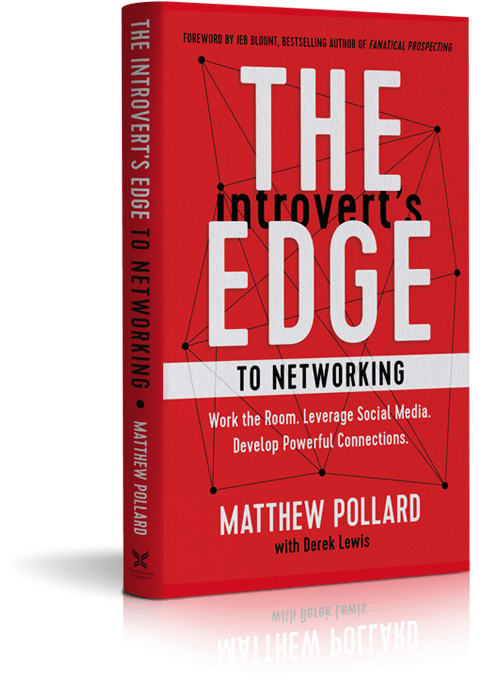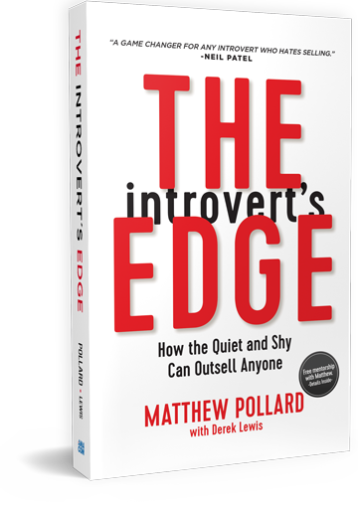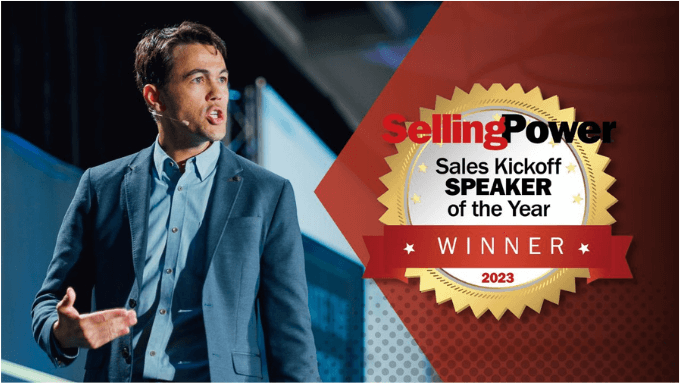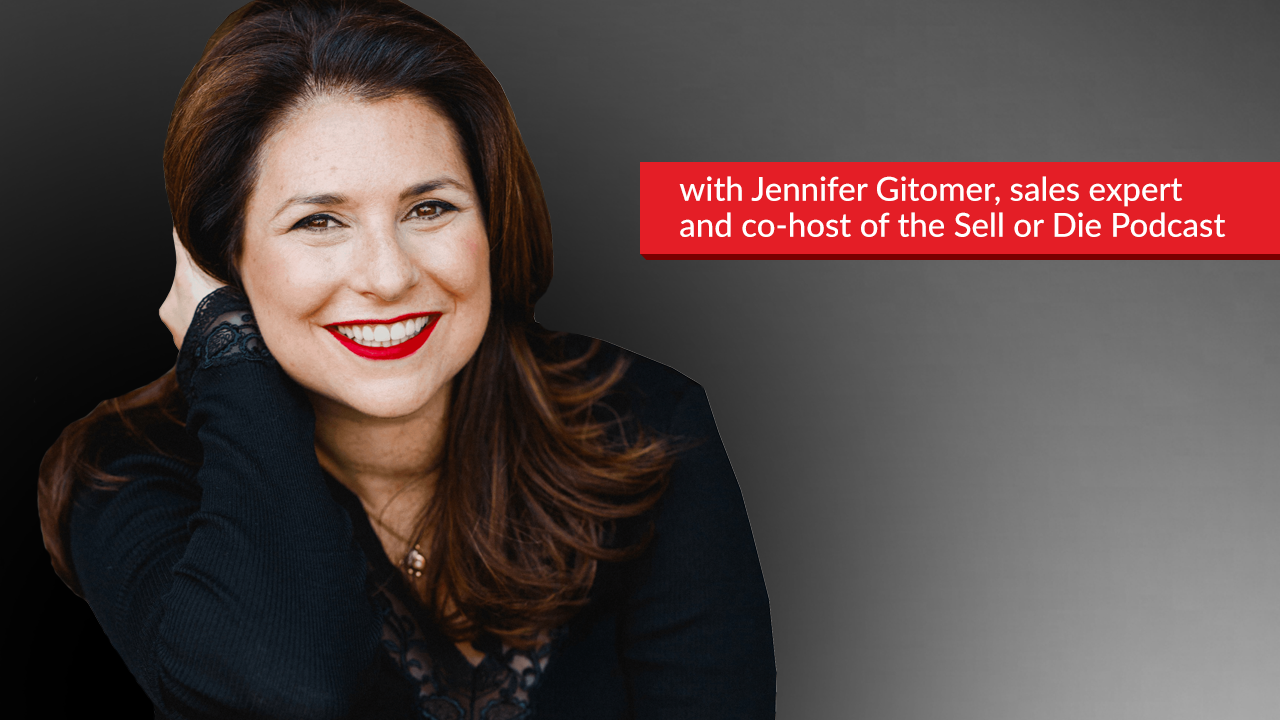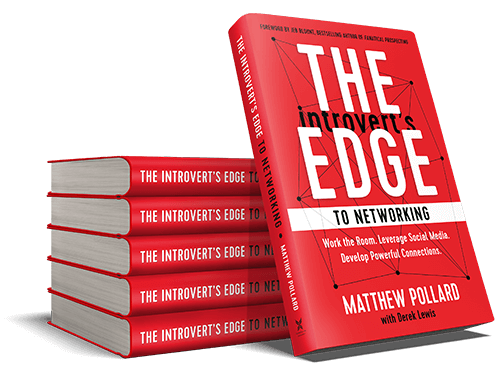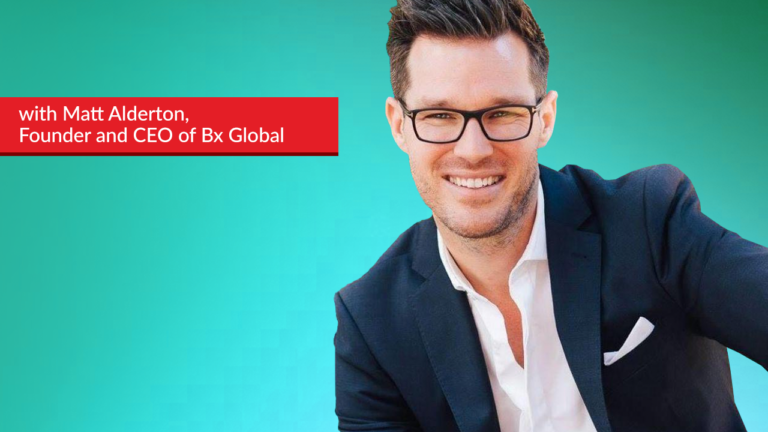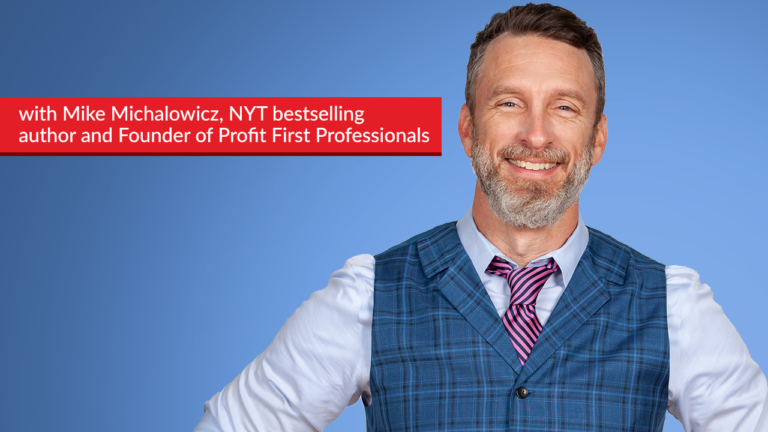Asking Critical Questions for Sales Success
Matthew: Hello, everyone, and welcome back to the Introverts Edge podcast. I’m ecstatic to have you with us and I’m beyond ecstatic to have with me Jennifer Gitomer. And I have to say that she has her own podcast called Beyond Babe, but also she is the co-host of another podcast called Sell or Die, which is actually a podcast that I’ve been on.
And I have to say we went deep into some really cool topics. So if you haven’t checked that out, you know, feel free to press pause on this one. We’ve got some great content, but feel free to press pause on this one and go and check that one out because you get to learn a lot about Jennifer and introversion there as well.
Now, she’s also the author of a book called Sales in a New York Minute, which is definitely a terrific read. But she talks about the sales world, a sales career, and how to be successful sales professionals, which we all know introverts sometimes feel that they can’t be. And it’s my mission in life to help introverts realize that they can not only survive in the introverted world, but absolutely dominate their introverted qualities, which Jennifer definitely has.
So with no further ado, I’m going to welcome Jennifer. Thank you for coming.
Jennifer: Thank you for having me on your show. And just in case anyone is looking for my podcast, it’s the Breakthrough Babe Podcast.
Matthew: My apologies, the Breakthrough Babe Podcast.
Jennifer: Point break breakthrough. You know, I closed their closed and thought it would.
Matthew: Be on the breakthrough. So the people they should definitely check that out. I will say that you know with Jennifer when you hear on that podcast, when you hear on Sell or Die, when you get to see how she presents herself in this interview, you realize very, very quickly that this is a dynamic person. And you may find it very hard to believe that this person could be introverted.
So let’s let’s really break that down for a second. And Jennifer, let’s for that for those people that that kind of aren’t familiar with your story, help me understand, like, was the time that you realized that you were an introvert or was there a specific thing you struggle with that then became that realization that you weren’t going to help me understand that.
When Jennifer Realized She Was an Introvert
Jennifer: So there have been lots of different individual moments where I realized how that I am an introvert. So for example, when I was very young, about five years old, my dad took me to be on Sesame Street, live in New York City, and it was the first time he had taken off. And it was a really big deal because he own his own business, but it was always working.
And we got to the big tall building in New York and walked in and there I am supposed to go on stage and I froze. And on the way in I had seen like a vending machine and I really wanted a chocolate bar. And my dad was like, sure. Like after the show you can have a chocolate bar or whatever.
And he kept I remember so deeply, like he was like, Well, you’re not going to get that chocolate bar. And I really wanted it, right? Like, you’re not going to get the chance of our which to a kid is a big deal. Like now I’m like, okay, I’ll have a chocolate bar tomorrow if I into one today. Right.
But but then it was a really big deal and I couldn’t do it. I just froze and it was and looking back now, I realize it was because of my introversion that that that experience going up on stage, being on TV, being with the characters that I had watched, and now I’m going to be in the show. It was just it was just too much.
I wasn’t I wasn’t prepared for it. And then just like lots of different social situations, you know, where you go to a party and you’re exhausted because you’re having to be on, so to speak, and talking to so many people. And one thing I realized when I started dating my husband, my now husband, Jeffrey, is that we would go to some place and he would be totally energized, Like we’d go to a networking event or meeting, he’d be totally energized and he’d be like, okay, what’s next?
And I’m like, What’s next? Like, I have I have to go home and take a nap. Like, that was a lot of fun. But like, I’m, I’m just fully drained, you know? And, and, and that was a big understanding too, of like, oh, wow, this is what it means to be introverted.
Matthew: You know, I think that’s really important thing for people to embrace, actually, because having being interviewed by the two of you, you can’t tell your styles apart. You seem to bounce off each other and there’s a lot of give and take. But if I was to watch it as an external observer, there’s no way I would go, Well, obviously I would definitely say Jeffrey is and is an extrovert.
He’s very out there, but I wouldn’t have been able to go. Well, hang on a second. Jennifer really isn’t. At the end of that interview. I would have imagined that both of you viewing it externally would have then wanted to continue the conversation, wanted to, you know, go out and have more meetings where, you know, he says, I was there.
You know, you would definitely do that. I mean, that was a very long interview. We went into a lot of depth and Jeffrey definitely wanted to keep chatting, but you were tired. And I think that a lot of people, they’ll see people that are performing and go, it’s easier for them and it’s not for me. So I think it’s really important to kind of highlight that.
How did you how did you come to a place of comfort where you could say to someone like Jeffrey, I mean, a lot of people here have business partners that are extroverted. A lot of people have family members that are extroverted. They’ll go to events with. And I find more often than not, there’s no dialog about how they can work around and work around their different personality types.
So when I say work around, it’s not positive that an extrovert wants to keep going. It’s not positive. Sometimes an introvert just wants to stop. So there needs to be a common dialog and a common conversation and understanding. How do you navigate that in your relationship and your partnership in both business and in life?
A Sales Process for Introverts
Jennifer: Yeah. So if you let the fact that you are an introvert prevent you from gaining the success that you deserve in life, then that’s not fair to you, right? So it doesn’t have to be something that’s holding you back and you have to figure out, well, how can I use this to my advantage? And one of the things is like I find which is really cool for introverts is I ask a lot of questions, so I ask about the other person because I genuinely want to know about the other person.
And also it takes the pressure off having to be the entertainer and having to be the one providing all the information. And so when I can ask questions about the other person, it creates the conversation, it builds the relationship. I’ve had meetings back in my big networking days. I’ve had hour long one on one meetings with a new person where I’m getting to know them or they have not asked me one thing about myself, and I have asked them the whole time.
Like usually it’s about 50/50, right? But I’ve had some where the whole time I’m just learning about them. And they say at the end, Oh my God, this was the best meeting ever. I feel like we’re BFF. This is so amazing. Like, I can’t wait to refer you to all these people. And I’m like, What do they even know about me?
Right? They didn’t ask anything. But the thing is, when you allow people or invite them and give them the opportunity to talk about themselves, they frickin love it. And so it takes the it it takes the pressure off a little bit. When you’re an introvert, if you can keep it, the conversation around them. This is one of one of the things I do, and we can go into others as well.
Matthew: Yeah, absolutely. And I think that’s really important for people to to hear because I mean, Jen definitely has a nature to herself that allowed her to embrace the fact that if she’s asking questions, it’s not taking as much energy. So instead of going, no, I need to behave more extroverted. I’ve got to be in people’s faces, I’m going to be asking your questions, but getting straight to talking about what I do, she realized that is a strength to playing the more passive ask questions role, and that actually often leads to more deals for her as a successful salesperson.
Now, again, this is systematic, and I think both Jen and her husband Jeffrey will agree systems and process definitely wins over everything else. But systems and processes are different based on personality types, different skill sets and Jennifer had to find one that was unique for her. I’m interested in the dialog that you have when you’re asking these questions because a lot of people feel like they’ve got to get in, they’ve got to talk about their products or they’ve got this meeting now.
They’ve got to make it count. Yet more often than not, that leads to people going, Well, actually, can you just write this really in-depth proposal? Or, you know, they don’t feel like the customer cares about anything but price or that they’re not really engage or excited to buy? How do you help? How do successful salespeople really get to leverage this question process to get past that barrier?
Because I know you talk about that frequently when it comes to a sales career. Yeah.
Jennifer: So it’s interesting. I actually don’t see asking questions as being passive because when you ask questions, you control the conversation. And so I see it as and maybe you’re talking about like active, like being, you know, pushing out effort and activity in that way. But I actually see it as as you’re controlling the conversation when you’re asking questions because you get to then you’re like a GPS system and you get to guide them exactly where you want to go.
And so to give you a practical example, like let’s say someone cold calls me up on the phone and you’re looking for my services and I coach entrepreneurs on how to make more money and how to let go of mindset blocks. I’m really into mind, body and spirit and all of that playing a role, not just sales performance but just the sales strategy.
Right? And so I’m going to want to use critical thinking to uncover like, Oh, okay, well, what what’s going on in your business right now and how did you find me and what led you here? And okay, so if that’s going on, what does that look like? What does success in sales now look like for you? What are you hoping to achieve? Right. I’m going to ask you, not all at once, but I’m going to ask you questions that feel natural based on whatever answers you provide to me.
And so if you can ask them, like where they’re at, what they’re hoping for, if you had like if I had a sales magic wand, what would be the outcome for you? Right. And what’s prevented you from getting there in the past And you can ask questions like that and then just turn it and relate it to whatever industry you’re in.
And and that gets them to open up and then now you have like a case file in your head of information. And so imagine you’re like an investigator trying to uncover and get to the root of what’s really going on. And when you can dig deep and really care and be genuine about it and understand what’s going on, what do they need?
Now, you can take all that information that’s already in your head about your products and services and make a match and say, okay, this is what they need, this is what I have. How can what I have solve what they need and then talk to that specifically rather than just showing up and throwing up? Because if you show up and throw up and talk about you, you, you and everything you have, then why would they want to listen anyway?
They don’t even know if it if it meets any of their needs.
The Right Mindset for Sales Calls
Matthew: That’s perfect. So I think what people are hearing, or at least I hope they’re hearing, is asking questions, is not a negative. It’s going to empower you and the whole sales department. It’ll give you the ammo that you need to align them with the products and services that you need. So a lot of times people will think that if they’re not actively talking at people, they’re not selling.
But that’s the wrong mindset to have when it comes to sales, because to sell means to serve and you can’t serve unless you understand. Now I find, though, a lot of introverts struggle with asking questions because they don’t know what type of questions to ask that is going to lead them to their product. So they therefore end up asking very general questions that potentially don’t link to the product.
So when people are thinking about what types of questions to ask, should they be thinking about specific, how do, how do you plan the questions? Do you do it organically on the fly? Do you do you suggest that especially introverts, do some planning about the types of questions they should be asking to get to the crux of the issue, what would you recommend there?
Jennifer: So I start out with genuinely wanting to know about them and like about them as a person. Right? Where did you grow up? Tell me about you. And I wouldn’t say such a broad question, like, Tell me about yourself, but I would already know something. So for example, we were just me hanging with someone who told me on one conversation that they play tennis.
So I asked, How did you get into tennis? And that led to this whole story about how they used to play as a kid and how they got hurt as an adult and then got wanted to get fit again and like and now it’s like, Oh, wow, we’re really bonding because he’s opening up about, you know, stuff that that only because I asked about a shared value, right?
Because I love tennis. And so if you have if you can figure out what are some shared values that you have with them, shared pieces of information that will help you build more rapport as a pert, like before you even talk about business stuff, get to know them because people do business with people they like. It’s that simple.
Yes, they need to know you and trust you. Yes. But if they don’t like you, it doesn’t matter if they know you are trust you, right? They have to like you. And and I mean, I tell people all the time, I only do business with people I like. Like literally life is too short and I’m not going to spend time working with people that piss me off like it’s it’s not worth it.
And so and, and so, yeah, that’s a luxury to get to do that. But, you know, depending on what you do, if you’re an entrepreneur, you get to choose your clients are you get to choose who you attract by what you put out because your vibe really does attract your tribe. And so and so questions. I would learn about them first and then I would talk about, okay, so what is it that you do and how do you do it?
And maybe you, you, you’re supposed to know that already going in, depending on the nature of the conversation, if it’s a networking meeting, you might not know that much. If it’s a potential client, you should already know why you’re sitting down with them and what they do and then uncovering their needs. Like people buy answers to problems, They buy solutions to problems.
You know, if they don’t have a problem, they’re likely not not going to buy something new for it. If you think back to your last three purchases, big purchases, think about what they solved. Okay, I am I bought a Berkey, which is like a water filter because I’m pissed off about all the No, not pissed off. That’s like the wrong term, but I don’t like all the stuff that they add to our water.
And I want to drink clean, healthy, good water. And so I spent $500 on a water filtration system so that I could feel the high frequency water, which to me makes a difference. It solves a problem, right? The problem is the tap water isn’t good. The problem is bottled water is is plastic. And that’s also not good. They’re saying there’s plastics in bloodstreams now, which is very interesting.
And so so the solution is what’s the best filter? What can I find that can take out all the junk? Right? So that solved the problem. If I didn’t have that problem, I would not have spent $500 on a filtration system like it just wouldn’t happen. Right. So if you don’t if the water thing is not an issue to you, you’re not looking for that.
But it was an issue to me. Right. And so your customers are buying your stuff because they’re solving something. And so you have to uncover what is that need? What have they tried in the past? What did it work? Did not work, What did that look like? And then what’s your differentiator or how can you help them in a way that they haven’t been helped before?
Matthew: Absolutely. I think that’s a really powerful set of piece of advice, because I can tell you even the other day and it it’s terrible being a sales trainer because you get to see some horrific sales presentations and pitches. And the the other day, I have to admit, I grimace because we got on this call and it was a demo and they immediately started telling me about how their product can help me.
They had not identified who I was, what I do. They hadn’t asked me any questions how I wanted to use it. They just wanted to show me their tool in the hopes that I would see how it applies now for me. I then started asking questions to try and find a way to make this to work for me because I actually wanted it, but I couldn’t navigate the conversation to get where I wanted.
Where if he had just asked me some simple questions about what research I’d done to find them, what specific applications I was hoping to get out of it. All of a sudden, the whole conversation would have been different. Yeah, we assume that a lot of the times when somebody is asking us, when somebody brings us in for a sales conversation, they already know why they want our product and they already have an understanding.
They’re just looking for a quick demo or a quick understanding of what the pricing is. They’re not experts. You’re the expert and you have to do that coaching to find out what the requirements of potential customers are and then help mix it with the specific product or service that you offer. So questions are everything.
Jennifer: It’s like when you go to the doctor and you walk in as the patient and they don’t just say, okay, here’s your script. They say, Oh, what’s wrong? What’s going on? How can I help you? Right? And that’s the same thing. You are the doctor of whatever solution you offer to your clients, and you need to uncover what is going on.
Matthew: Absolutely. And I think that’s actually a really great analogy because how many people go to the doctor and say, I have a sore throat, I need penicillin? And the doctor’s like, Well, hang on a second. It could be a spectrum of other things and we need to make sure that we’re applying the right solution, not just a solution to the outcome, because the worst thing in the world is if they do buy something that doesn’t suit their needs, now you’ve got to deal with an unhappy customer.
But secondly, if you’re likely to sell to them, if you ask the right questions, because they’re not going to ask you for a proposal that they’re not even going to read. So it’s so important that asking those right questions, I know that a lot of people and a lot of introverts that are listening to this like, okay, I understand.
I’m going to have to ask questions, I’m going to have to problem solve here. But what if I ask a question? They give me a short answer or they’re they’re not giving me the information that I need. I’m scared of asking more questions because I’m scared that I won’t get the answers that I want or that they won’t have the right answers or they’re going to get frustrated and then start asking about price.
What advice would you give to those people thinking about that?
Jennifer’s Advice for Introverted Salespeople
Jennifer: Yeah, that’s that’s a good question. So you always need to start out with knowing where you want to want to go. Okay. So when you’re doing a maze, when you’re doing like those puzzles that you did probably as a kid, right? You know that you start here and your goal is to end here and wherever here is at the you can literally see it.
You don’t know how you’re going to get there, but you know where you’re starting and where you’re ending. And so if you know you want them to end with some sort of need for whatever it is you’re selling, then you have to figure out what are all the probing questions that you can ask that can get you there.
And it’s not. Let me ask you a question and then another question and then another question you ask based on their responses. I can’t give you a script for this because it’s not scripted. It’s a skill of listening and then taking the information that you have and turning that into, okay, that does that. It’s like it’s like clue, right?
Like, does that give me one step closer? Okay, If it got me one step closer, what do I need to get even closer? And you just keep going until you get to a mutual understanding of whatever it is. But the key to that is knowing where you want to end up and so if you’re just asking questions to ask questions, then you’re going to sound like an idiot, right?
But if you if you ask questions with a strategy in mind and it’s not in a manipulative way, it’s really in a way so that you can help them, then then you will end up in the right place. And by the way, introverts make really great listeners. And so that is a skill that you already have and you get to use.
And so extroverts like to keep talking and and and then they miss sometimes, sometimes not all the time, but sometimes they miss a key element, right? And so because they’re focused on what they want to say next. And so as an introvert, you get to have the one up there.
Matthew: Absolutely. So what I’m hearing is firstly, have a plan, go in to any sales appointment knowing where you want to go, then have a mindset of serving that client and you can’t serve them unless you understand them and how your product applies and then ask questions and to you understand exactly why your product is the right choice, the right fit, and then go into the selling.
But if you skip that because you believe that they don’t want you to ask a thousand questions or you skip that or ask the wrong questions because you didn’t have a plan where you leverage the power of empathy and active listening, i.e. you’re listening to what they say and you’re empathizing with what they say. So that then brings you to your next question, like introverts do really well.
You’re then going to get to the selling. Go. Why don’t they respect me? Why don’t they appreciate my product? Why are they asking for a proposal? Why do they care about price? So we’re doing it to ourselves because we’re not listening and we’re not empathizing. We’re not using on natural, introverted skillsets. Now, Jennifer and I are going to be doing a separate interview on the quietly influential summit, where we’re going to go deeper into some of these topics.
We’re also going to be talking about how introverts can actually do this thing called appointment setting, right? Appointment settings sometimes uncomfortable for the average introvert. So we’re going to go deeper into how to do that, because if you’re an entrepreneur and you’re not setting meetings, you’re going to be in business for very long. So we’re going to go deeper into that.
Jennifer’s Introvert’s Edge
But I have to ask Jennifer the question that I ask everybody at the end of this interview, which is, Jennifer, what do you consider your introverts edge?
Jennifer: I, I think well, being an introvert in general is the edge. And it’s everything that makes up being an introvert that gives you that edge because it makes you uniquely you. It makes me uniquely me. And so the ability to listen and empathize, which is what we literally just spoke about, is a huge portion of the edge. And then knowing that I’m an introvert, I am choosier.
That’s the right word. I’m more selective with the people I spend time with. And so the people I spend time with know that I really want to be there and I really want to be present with them because I’m choosing to be with them. They don’t they might not know it from an introverts perspective, like, Well, I know I’m an introvert, so I’m choosing to spend time with, you know, it’s not like that, right?
But they can feel it by my actions. Like I am choosing to spend time with these people because it gives me energy, spending time with these people and and that’s a big part of the edge. But honestly, listening in the sales reps perspective, listening and empathizing is is huge. It’s what made me great at networking, great at meeting people and asking those questions and just listening.
Matthew: I think that’s that’s a great edge to have. And both of them, I think the ability to not feel obligated to meet with everybody but choose is something that a lot of introverts don’t do often enough. We we feel we shot everybody off. We feel we end up doing the things we’re obligated to do as opposed to the things that truly make us happy with the people that really add value to us as well.
So I think that’s an edge that everybody else should embrace much more frequently than that. A Listening to this podcast. But Jen, thank you so much for sharing so much value to our guests. And I know we’re going to be interviewing you on the quietly influential Summit shortly, which people can access at the quietly influential summit dot com.
But for those people that are listening to this on the road, you know what? I want more Jens work. I want more advice from her directly. Where would people where would you suggest people start.
Jennifer: Yeah the best places to go to my Instagram at Jen Gadamer or to go to my website Jen Gadamer dot com and if you listen to it, if you do me on Instagram or when you do me on Instagram and let me know that you heard me on this show, I’ll be happy to send you some valuable information that you can download for free.
So just do me and let me know that you that you heard me on the show because I like to actually make real connections, Right? It’s not just like, Oh, check. I added another follower. Like, No, like I actually like to know who I’m connected with and how they found me. So let me know. And I’d love to chat with you.
Matthew: That’s terrific. So everyone definitely take her up on that. I mean, how many people, especially in a sales influencer world, actually say, Hey, reach out, say hello and be genuine with me? But really, everything you’ve heard today is that Jen asks questions to be genuinely interested and she empathizes and ask follow up questions because she’s genuinely interested and she has dialogs with people because she genuinely cares and she hangs out with the people she genuinely cares about.
So really take the opportunity to embrace that mindset into everything that you do and you’ll find that life goes a lot more. It’s a lot more successful for you, but you’ll also be a lot happier as well. But for today, thank you so much for everyone joining the introverts Edge podcast yet again and I look forward to seeing you in the next interview.
Thanks everyone.







